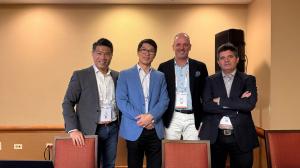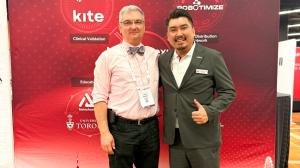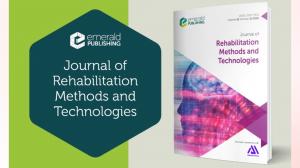Robotimize Leaders Appointed as JRMT Managing Editors, Bridging Industry and Academia

(Left to right) Zen Koh, Strategic Advisor at Robotimize Group, and Professor Denny Oetomo, Co-Founder and CTO of Robotimize Group, serving as Managing Editors of JRMT alongside Editors-in-Chief Professor Robert Riener and Professor José L. Pons.

(Left to right) Professor Milos R. Popovic, Editor-in-Chief of JRMT, with Even Koh, Group General Manager of Robotimize Group

JRMT represents a paradigm shift in rehabilitation research publishing—embracing the complete innovation lifecycle from proof-of-concept through clinical validation to real-world implementation
Robotimize supports JRMT as Zen Koh and Prof Denny Oetomo serve as Managing Editors, bridging industry innovation with evidence-based rehabilitation research.
As rehabilitation technology advances from laboratory concepts to clinical reality, Robotimize reinforces its commitment to evidence-based innovation by supporting JRMT—a peer-reviewed journal addressing the complete research lifecycle from proof-of-concept through real-world implementation.
Robotimize Group is proud to affirm its role as advocates of rigorous rehabilitation research by supporting the Journal of Rehabilitation Methods & Technologies (JRMT), a groundbreaking peer-reviewed publication launched through collaboration between Emerald Publishing and MotusAcademy. This endorsement reflects Robotimize's conviction that technological innovation must be grounded in scientific evidence, transparent methodology, and measurable clinical outcomes—principles that define both the company's product development philosophy and the journal's editorial mission.
The significance of Robotimize's support extends beyond institutional advocacy: Zen Koh, Strategic Advisor at Robotimize Group, and Professor Denny Oetomo, Co-Founder and CTO of Robotimize Group, serve as Managing Editors of JRMT alongside Editors-in-Chief Professor José L. Pons, Professor Milos R. Popovic, and Professor Robert Riener. This leadership bridge between commercial innovation and academic scholarship positions JRMT as a unique platform where industry insights inform research priorities while peer-reviewed science guides technology development.
The Significance of Rehabilitation Research
The rehabilitation technology field has long confronted a critical gap: promising innovations struggle to transition from promising prototypes to validated clinical tools because traditional academic journals focus narrowly on endpoints—polished results rather than the methodological journey that produces them. Early-stage research, novel design approaches, proof-of-concept studies, and real-world implementation challenges often lack appropriate publication venues, creating an "innovation valley of death" where valuable insights disappear between laboratory and clinic.
JRMT addresses this gap by embracing the complete research lifecycle. The journal welcomes research papers presenting established findings, technical papers documenting early-stage innovations and educational methods, practitioner papers offering evidence-based clinical perspectives, and case studies analyzing technology applications including proof-of-concept work. This inclusive scope creates pathways for knowledge that conventional journals exclude—precisely the information that accelerates translation from concept to clinical impact.
Coverage spans rehabilitation robotics, AI integration, prosthetics and orthotics, brain-machine interfaces, virtual and augmented reality, telerehabilitation, functional electrical stimulation, and assistive technologies—the technological landscape where Robotimize's VivantePlexus™ platform and ACE™ partnerships operate.
"Supporting JRMT aligns naturally with how we build rehabilitation technologies at Robotimize. Evidence drives our development process—from early prototypes through clinical validation to real-world deployment. A journal that values methodological transparency and reproducibility as much as outcomes creates the knowledge infrastructure our field desperately needs," said Kerry Guo, Founder and CEO, Robotimize Group.
Bridging Industry Innovation and Academic Rigor
The connection between Robotimize's mission and JRMT's scope becomes evident when examining the company's approach to technology development.
VivantePlexus™—Robotimize's integrated rehabilitation ecosystem—didn't emerge from isolated engineering efforts but from iterative cycles of clinical observation, prototype refinement, pilot studies, outcome measurement, and protocol optimization. Each technology in the platform represents resolved research questions: How do we design hand exoskeletons that accommodate individual anatomical variation? What algorithms enable FES systems to synchronize electrical stimulation with voluntary movement attempts? How can gait training systems adapt difficulty in real-time based on patient performance?
These aren't merely engineering challenges—they're research questions requiring rigorous methodology, systematic documentation, and transparent reporting. JRMT provides the venue where such work receives appropriate scholarly recognition while remaining accessible to practitioners who need actionable insights rather than purely theoretical knowledge.
Similarly, Robotimize's ACE™ partnership model relies on evidence-based technology evaluation. When assessing potential partnerships with specialized rehabilitation technology developers, Robotimize examines published research, clinical validation data, safety profiles, and real-world implementation outcomes. A robust academic literature—the kind JRMT aims to cultivate—makes these assessments possible, ensuring that technologies entering Robotimize's ecosystem meet evidence standards that protect patient safety and clinical effectiveness.
Research Priorities Aligned with Clinical Reality
JRMT's scope directly mirrors the technological domains where Robotimize operates and the research questions the company confronts daily:
+ Rehabilitation Robotics and Application: How do robotic systems optimize therapy dosage while maintaining patient engagement? What biomechanical principles should guide exoskeleton design for diverse patient populations?
+ Artificial Intelligence: How can machine learning algorithms personalize rehabilitation protocols based on real-time performance data? What safety standards should govern AI-driven therapy adjustments?
+ Functional Electrical Stimulation: What stimulation parameters maximize motor recovery while minimizing discomfort? How do we integrate FES with voluntary movement to enhance neuroplastic adaptation?
+ Telerehabilitation: What technologies enable effective remote therapy delivery? How do we maintain treatment fidelity when clinicians aren't physically present?
+ Brain-Machine Interfaces and Neuromodulation: How can non-invasive technologies support cognitive rehabilitation? What ethical frameworks should guide emerging neurotechnology applications?
These research priorities reflect Robotimize's conviction that rehabilitation technology advancement requires more than engineering innovation—it demands systematic inquiry into clinical application, patient experience, workflow integration, and outcome measurement.
Leadership Perspectives: Research as Foundation for Innovation
Kerry Guo, Founder and CEO, Robotimize Group: "Every technology in our VivantePlexus™ platform and every partnership in our ACE™ network began with research questions: What do patients need? What do clinicians require? What does evidence suggest works? Supporting JRMT reinforces our commitment to letting science guide rehabilitation technology development. When our leadership team contributes directly to academic publishing standards through editorial roles, we're investing in the knowledge infrastructure that benefits the entire rehabilitation community."
Zen Koh, Strategic Advisor, Robotimize Group; Managing Editor, JRMT: "JRMT fills a critical gap in rehabilitation literature by valuing the research journey as much as the destination. Early-stage innovations, methodological refinements, and implementation challenges all deserve scholarly attention because they contain the insights that accelerate field-wide progress. My advisory role with Robotimize creates opportunities to ensure that industry questions inform research priorities while maintaining the academic independence essential to credible science."
Professor Denny Oetomo, Co-Founder and CTO, Robotimize Group; Managing Editor, JRMT: "As both technology developer and academic researcher, I've experienced the frustration of valuable work lacking appropriate publication venues. JRMT's inclusive scope—welcoming technical papers, practitioner perspectives, and proof-of-concept studies—creates pathways for knowledge that traditional journals exclude. This benefits everyone: researchers gain recognition for important work, developers access insights that inform better products, and clinicians find evidence that guides practice. Robotimize's support reflects our understanding that robust academic literature elevates the entire rehabilitation technology field."
Supporting the Complete Research Ecosystem
Robotimize's endorsement of JRMT extends beyond symbolic support to practical commitment: encouraging internal research teams to document development methodologies for peer-reviewed publication, sharing clinical validation data and implementation outcomes that inform broader practice, participating in journal-sponsored conferences and knowledge exchange forums, and promoting JRMT within Robotimize's network of clinical partners, research collaborators, and technology developers.
This approach recognizes that rehabilitation technology companies benefit when the field advances collectively. Published research documenting what works—and what doesn't—saves resources by preventing redundant failures, accelerates innovation by building on validated approaches, and protects patients by establishing evidence-based safety standards.
The journal's partnership with MotusAcademy, an international association dedicated to rehabilitation education and technology translation, further amplifies its impact. MotusAcademy's continuing education programs, certification pathways, and global networking initiatives create direct channels for research insights to reach practitioners who implement technologies in clinical settings.
VivantePlexus™ and ACE™: Built on Evidence, Advancing Through Research
Robotimize's business models inherently depend on the kind of rigorous, transparent research that JRMT promotes:
+ VivantePlexus™ succeeds when clinicians trust that integrated rehabilitation technologies deliver measurable outcomes. That trust emerges from published evidence documenting safety profiles, clinical effectiveness, and implementation protocols—the knowledge base JRMT aims to strengthen.
+ ACE™ partnerships require objective evaluation of specialized technologies from global developers. Published research provides the evidence foundation for partnership decisions, ensuring that technologies entering Robotimize's ecosystem meet standards that protect clinical quality and patient safety.
By supporting JRMT, Robotimize invests in the knowledge infrastructure that enables informed decisions by healthcare providers considering rehabilitation technology adoption, regulatory bodies establishing safety and effectiveness standards, researchers building on prior work to advance the field, and patients seeking evidence-based treatment options.
A Shared Vision: Research-Driven Rehabilitation Innovation
JRMT's editorial mission—comprehensive examination of the entire research lifecycle within rehabilitation technologies—directly aligns with Robotimize's development philosophy. Both recognize that innovation emerges not from isolated breakthroughs but from systematic inquiry, transparent methodology, iterative refinement, and honest reporting of successes and failures alike.
The journal's coverage of Rehabilitation 4.0—the integration of digital healthcare and advanced technologies—particularly resonates with Robotimize's work developing AI-enabled rehabilitation platforms that personalize therapy, track objective progress, and optimize clinical workflows.
"Supporting JRMT represents our belief that rehabilitation technology advancement requires collaboration between industry innovators, academic researchers, and clinical practitioners—all working from shared evidence rather than competing claims. When research becomes transparent and reproducible, everyone benefits: developers build better products, clinicians make informed choices, and patients receive care grounded in science rather than speculation," concluded Kerry Guo.
As JRMT establishes itself as the premier venue for rehabilitation technology research spanning early innovation through clinical adoption, Robotimize's support—reinforced by leadership contributions from Zen Koh and Professor Denny Oetomo—signals the company's commitment to evidence-based innovation that advances not just proprietary technologies but the entire field's capacity to deliver effective, accessible rehabilitation care.
About Journal of Rehabilitation Methods & Technologies (JRMT)
The Journal of Rehabilitation Methods & Technologies is a peer-reviewed publication launched through partnership between Emerald Publishing and MotusAcademy, led by Editors-in-Chief Professor José L. Pons, Professor Milos R. Popovic, and Professor Robert Riener, with Managing Editors Zen Koh and Professor Denny Oetomo. JRMT provides comprehensive examination of the rehabilitation technology research lifecycle, from proof-of-concept through real-world impact, covering rehabilitation robotics, AI, brain-machine interfaces, virtual reality, telerehabilitation, and assistive technologies. The journal welcomes submissions from researchers, practitioners, and students advancing evidence-based rehabilitation innovation.
About MotusAcademy
MotusAcademy is an international association dedicated to reforming the global rehabilitation ecosystem through education and technology. Guided by the motto "Rehabilitation for All," MotusAcademy provides continuing education in advanced robotics and rehabilitation technologies, certification pathways, networking forums, and research dissemination platforms. Through partnerships with leading institutions and industry innovators, MotusAcademy bridges the gap between emerging technologies and clinical practice, empowering practitioners to deliver evidence-based patient care worldwide.
About Robotimize Group
Robotimize Group is a next-generation health technology company headquartered in Singapore, specialising in intelligent rehabilitation robotics and digital neurotechnologies. Through VivantePlexus™, its integrated rehabilitation ecosystem, and ACE™, its strategic partnerships portfolio, Robotimize delivers comprehensive solutions that support motor, cognitive, and neurological recovery across hospital, home, and community settings. With regional hubs in Malaysia and Europe and a growing international partner network, Robotimize is redefining rehabilitation delivery—making it more personal, adaptive, and accessible. For more information, visit: www.robotimize.tech
Jerry HONG
Robotimize Group
+60 11-1224 1674
email us here
Legal Disclaimer:
EIN Presswire provides this news content "as is" without warranty of any kind. We do not accept any responsibility or liability for the accuracy, content, images, videos, licenses, completeness, legality, or reliability of the information contained in this article. If you have any complaints or copyright issues related to this article, kindly contact the author above.


